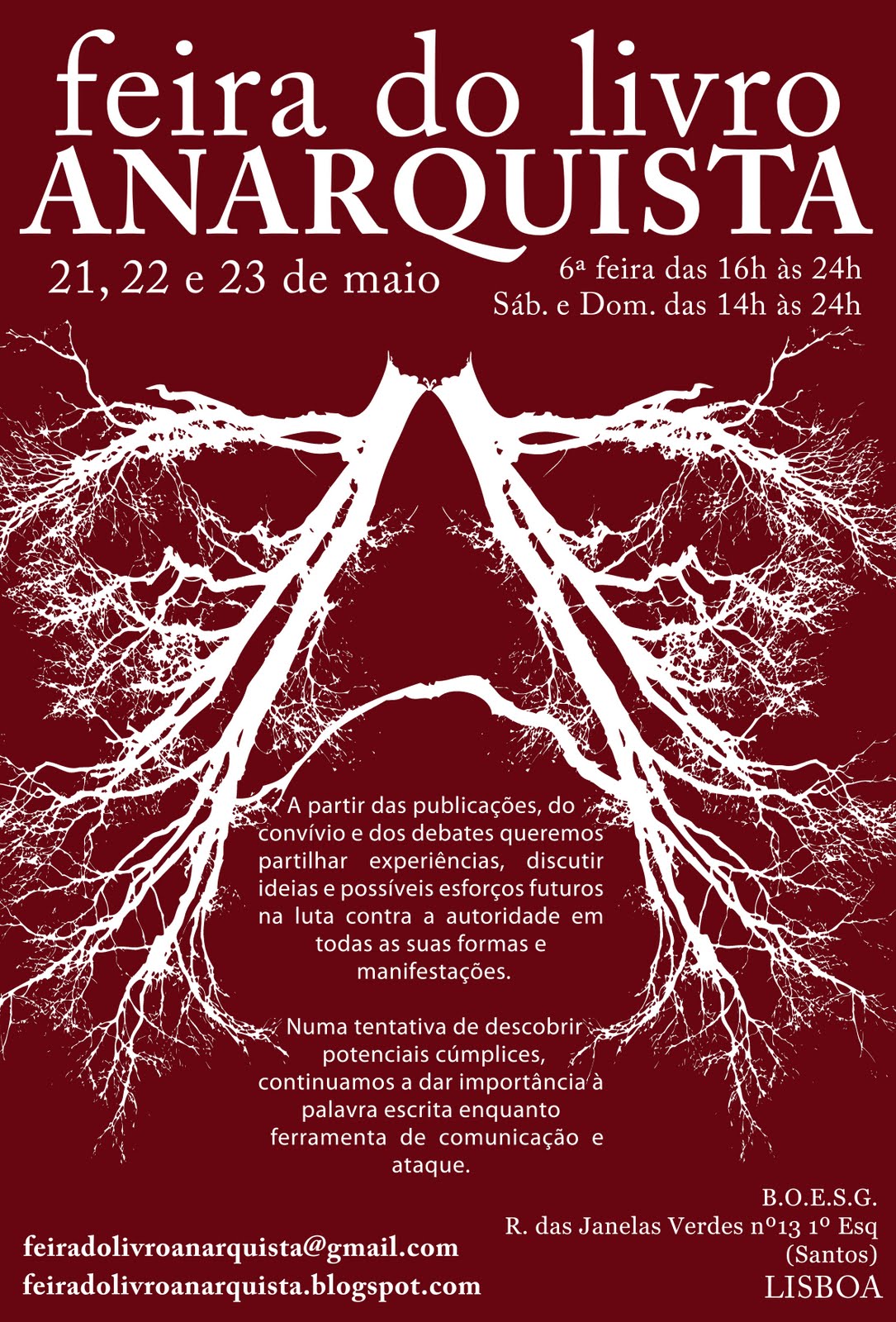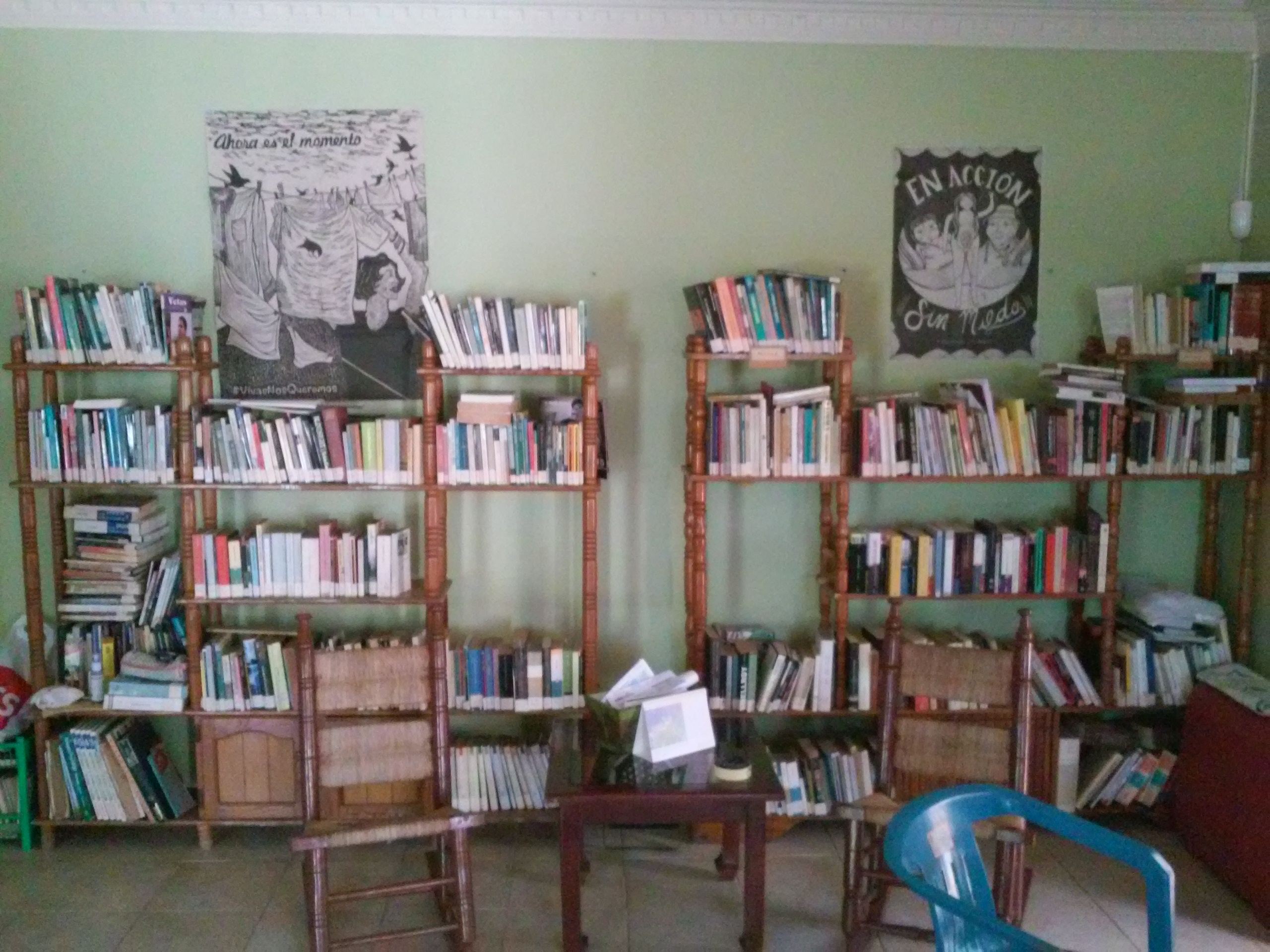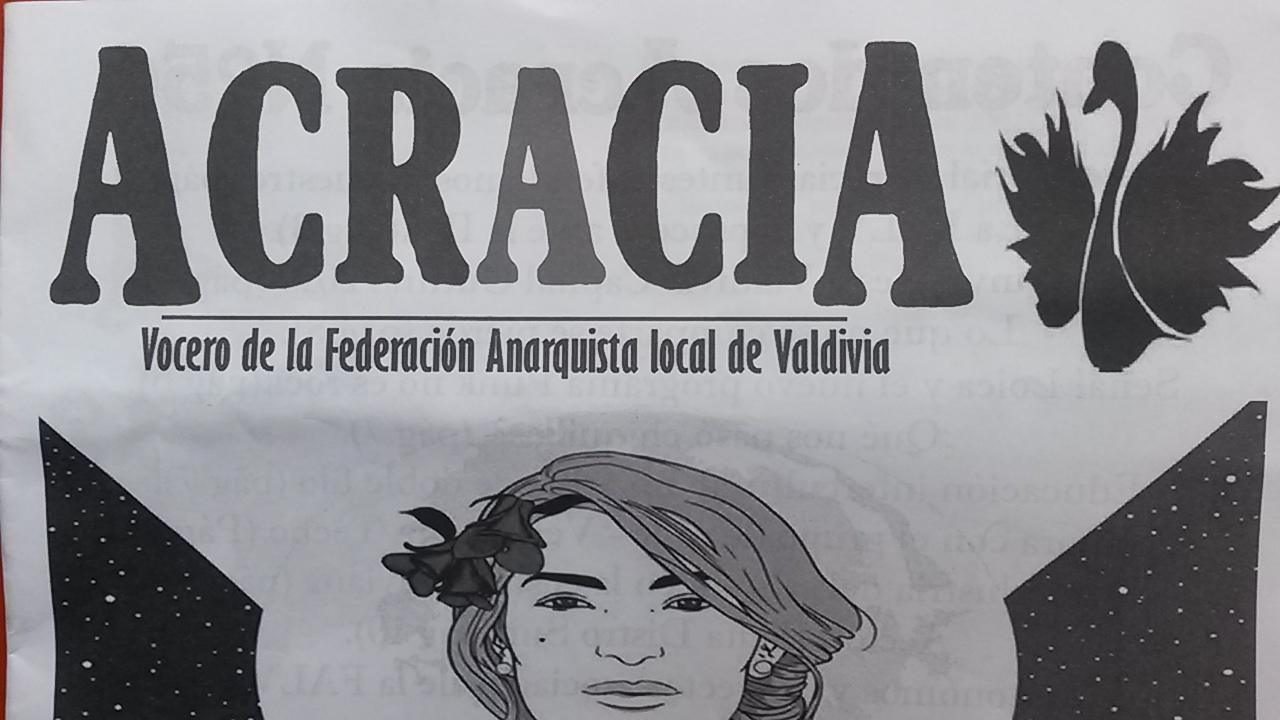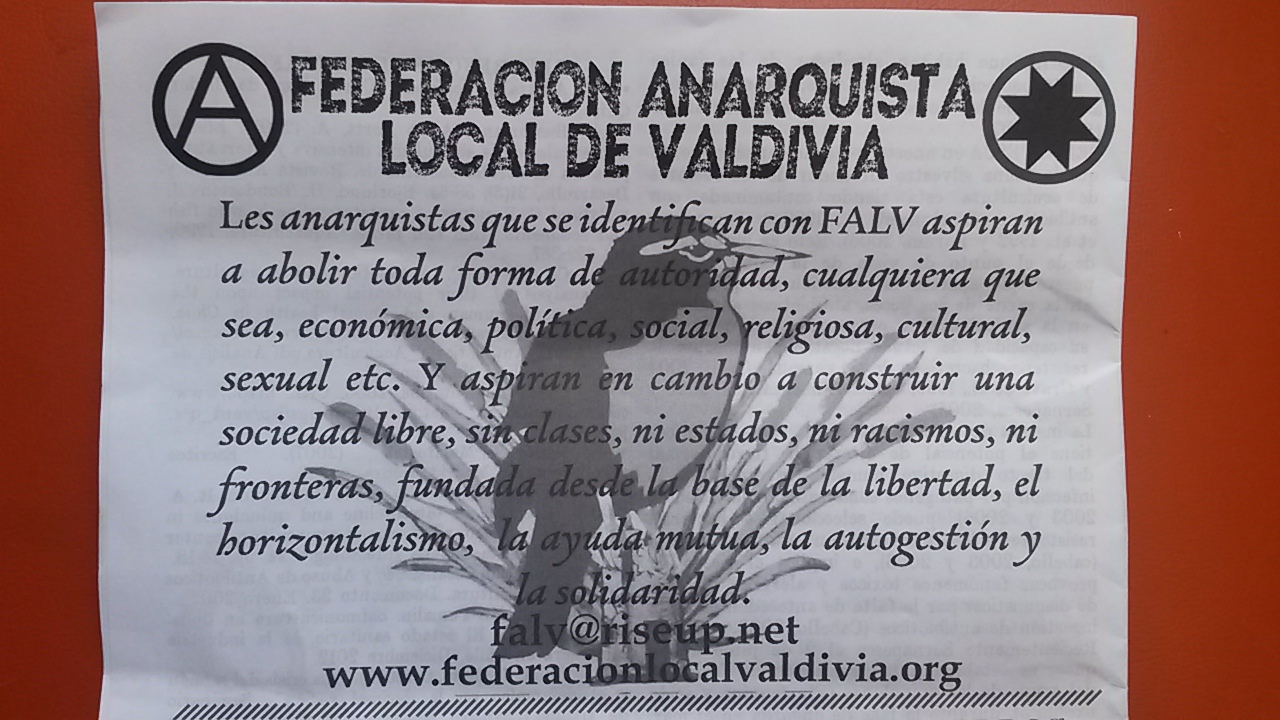It’s been a while since we added to the links and friends section of the Nest website but we are about to make up with it with a tale of books, birds and both.
The occasion was the 4 day weekend of the Congress of the International of Anarchist Federations (IAF-IFA) that took place in Frankfurt last weekend. IAF-IFA Congress is held every four years and is hosted by one of the international’s member federations, this time the German-speaking Anarchist Federation (FdA). A great feature of these events is the invitation of many groups and individuals who are not (yet…) members of IAF-IFA. The Frankfurt congress also attracted a good number of our host's member groups from all over Germany.
 During the morning of the first day, the invited guests had a chance to introduce their group or project and one of these was an amazing story from Lisbon of the rediscovery and development of a workers’ library. In the 1980s, some time after the ending of the dictatorship period in 1974, the library was spotted in passing by an anarchist who saw a flag in the window of a Lisbon apartment and thought she’d investigate. She found it was advertising B.O.E.S.G. (Biblioteca dos Operarios e Empregados da Sociedade Geral - Library of the Workers and Employees of the General Society). As a side-note from the word operario we can recall the interesting history of Operative Libraries in Nottingham.
During the morning of the first day, the invited guests had a chance to introduce their group or project and one of these was an amazing story from Lisbon of the rediscovery and development of a workers’ library. In the 1980s, some time after the ending of the dictatorship period in 1974, the library was spotted in passing by an anarchist who saw a flag in the window of a Lisbon apartment and thought she’d investigate. She found it was advertising B.O.E.S.G. (Biblioteca dos Operarios e Empregados da Sociedade Geral - Library of the Workers and Employees of the General Society). As a side-note from the word operario we can recall the interesting history of Operative Libraries in Nottingham.
Back then, knocking on the door, the comrade was received by two or three ‘old guys’ (Communist sympathisers or antifascists), some 4000 books consisting of a variety of good and ‘bad’ books (including guidance for the appropriate behaviour of women), and a load of very old heavy wood furniture. Banners read 'Workers must read, no matter what.' After some words were exchanged and others in the anarchist group had visited, two or three weeks later the anarchists were handed the keys! “Now we can die happy”, the old guys said. To add another side note, the running of projects by ‘old guys’ is repeated elsewhere in other countries including where anarchists have suffered repression, for example in Bulgaria where many of them were exiled under Communism but were able to return after the fall of the Berlin Wall to inspire a new generation of militants (who also help to get their biographies published).
The place was initially used for meetings and an organising space but since 2000 the process of sorting out the library began and BOESG was given new words for its acronym, Biblioteca e Observatório dos Estragos da Sociedade Globalizada - library and observatory of the damages of global society. None of the books have been thrown away, in keeping with the need to maintain a memory of bad times as well as its documented opposition, but new books and periodicals are added. An approach by an anarcho-punk project and massive rent rises in the area of the original building resulted in a move some ten years ago to a new jointly-run venue which now places the archive on one floor of a large building with shop front on to the street and 3 underground levels housing BOESG, a self-managed vegan kitchen, and a gig space at the very bottom (although with windows at the back - Lisbon is very hilly). This setup, especially with the kitchen, allows everyone to share rent costs, supporting many activities and buying of new books, and at the same time provide space for a lot more people to encounter anarchism, to read (of course!) and generally have a good time. An inspiring story, indeed. We were encouraged to join the international coordination of anarchist archives FICEDL (linked to CIRA in Switzerland) who had also been helpful in establishing BOESG in the new venue. We should do that before we become the old guys ourselves.
 Another important feature of the IAF-IFA Congress was the much expanded involvement of Latin American and Caribbean Federations, three of which (from Chile, Mexico and Brazil) completed their processes of joining the international on the first day. The Caribbean (and Central American) Anarchist Federation is a newer coordination consisting of groups in Dominican Republic, Cuba, El Salvador and others. In one city of the anarchist federation in the Dominican Republic, Santiago, we were told there is a social centre Cibao Libertario (see picture of the books in the centre from their Facebook page) with an associated book exchange project Biblioteca Libre where books are swapped one-for-one on the street. We can finish this section on Cuba where there is in ongoing project to purchase a social centre (please donate here). We alerted the Cuban comrade who visited Congress to the documents of the Syndicalist Workers Federation in Ron’s Collecton that we have digitised that includes letters from SWF to Cuba after the revolution and subsequent correspondence from the MLC, anarchists who became exiled in Miami (please see the Digital Library).
Another important feature of the IAF-IFA Congress was the much expanded involvement of Latin American and Caribbean Federations, three of which (from Chile, Mexico and Brazil) completed their processes of joining the international on the first day. The Caribbean (and Central American) Anarchist Federation is a newer coordination consisting of groups in Dominican Republic, Cuba, El Salvador and others. In one city of the anarchist federation in the Dominican Republic, Santiago, we were told there is a social centre Cibao Libertario (see picture of the books in the centre from their Facebook page) with an associated book exchange project Biblioteca Libre where books are swapped one-for-one on the street. We can finish this section on Cuba where there is in ongoing project to purchase a social centre (please donate here). We alerted the Cuban comrade who visited Congress to the documents of the Syndicalist Workers Federation in Ron’s Collecton that we have digitised that includes letters from SWF to Cuba after the revolution and subsequent correspondence from the MLC, anarchists who became exiled in Miami (please see the Digital Library).
Since birds have been promised we will now move on to the new IAF-IAF member organisation from southern Chile, FALV (Federacion Anarquista Local de Valdivia), which joined at the Congress in Frankfurt as mentioned above. A comrade from FALV brought copies of their paper Acracia (Anarchy) whose symbol is a Black Swan. Not only this, but the back of the paper featured another bird which turns out to be a FALV federation symbol, the Loica (long-tailed meadowlark, in English). Since anarchism in Britain also uses a good number of bird images, not least our own Sparrow (originally from Nottingham AF’s paper) and London AF’s Stormy Petrel press which comes from a poem The Song of the Stormy Petrel by Maxim Gorky written in 1901 (which is also less than complimentary about penguins), plus Freedom’s Raven, this became quite a talking point during one evening at the Congress. Swans are in popular consciousness in Valdivia following an environmental scandal 11-12 years ago when a paper pulp mill polluted a wetland, wiping out the population of 5000 swans. Action for the swans (Accion por los cisnes) was formed to fight for reparations. It is maybe natural for an anarchist group to adopt such a strong symbol of the excesses of capitalism but of course it is important to add the word Black in front. This, however, had caused some intrigue because the species in Chile is the black-necked swan whereas the black swan is another real species in Australia. The FALV comrade explained that Australian anarchists had quickly been in touch to say they were a group called Black Swan. Such are the ways that international anarchist contact is made! On the subject of the Loica (also called loyca or lloyka), this bird is a very important part of indigenous culture in the region. The bird has a bright red breast and is said to hold the blood of the Mapuche people (Spanish colonisation began in the 17th Century and the region was fully occupied by Chile in the 19th. Mapuche is still the biggest indigenous group). The Loica also has a shamanistic function as ‘brother bird’ and ‘full-healer’ using forest medicinal plants and is able to discern a person’s true nature and see the future (for more information see here).


We can complete our blog by highlighting one more beautiful project we encountered at the IAF-IFA Congress that, like the Sparrows’ Nest here in Nottingham, is both bird and book. Black Pigeon is an anarchist book and cultural centre in Dortmund, Germany and we will now display their poster at the Nest (see associated sticker graphic). May the wings of freedom continue to fly!

The Sparrows’ Nest, Nottingham. 9 August 2016. https://thesparrowsnest.org.uk